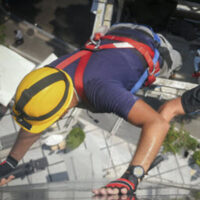What to Know About Falls in Workplaces

Employees can fall at work and sustain injuries under many different types of circumstances. Sometimes falls are “slips and falls,” or “trips and falls,” and they occur at the same level when an employee slips or trips on a slick flooring area or an object and falls to the ground. Under other circumstances, employees can fall from heights to a level below in work that requires elevated job tasks, such as work on ladders, roofs, or scaffolding. Employees can also fall down staircases, and they can fall from machinery they are operating.
What should you know about falls in the workplace, especially if you are an employee who was recently injured?
Falls Are Common and Often Cause Injuries
According to the Centers for Disease Control and Prevention (CDC), more than 800 workers die from fall-related injuries annually and more than 200,000 workers suffer fall-related injuries that require them to take days away from work. On a yearly basis, fall-related injuries end up costing approximately $70 billion.
Common types of injuries that occur in falls include but are not limited to:
- Broken bones, or fractures;
- Traumatic brain injuries;
- Sprains;
- Strains;
- Crush injuries;
- Cuts or lacerations; and
- Death.
Some Types of Jobs Involve More Fall Risks Than Others
The CDC clarifies that, although falls can happen at nearly any type of workplace, falls are more common in some types of jobs than in others. The industries that the CDC cites specifically as “at high risk of fall injuries” are:
- Nursing and residential care;
- Ambulance services;
- Building cleaning and maintenance; and
- Transportation and material moving.
Other common injuries where falls are common include health care and hospital work, airline and tarmac work, construction work, and retail and grocery store work.
Employees Who Suffer Fall-Related Injuries Could be Eligible for Workers’ Compensation Benefits
Under Maryland law, in order for an employee’s injury to be compensable through the Maryland workers’ compensation system, it must “arise out of” and occur “in the course of” the employee’s employment. This language does not mean that the employee must specifically be performing a job duty, or necessarily even be at their regular jobsite, at the time the accident occurs. But it does mean that the Maryland Workers’ Compensation Commission will consider the nature of the job and the type of environment in which the employee was working, and when and where the accident happened.
Injuries from falls can be compensable where the workplace posed certain fall hazards, and while an employee was either at work or at a mandated work-related activity. These distinctions can be complicated, so it is important to discuss the specific details of your case with a workers’ compensation lawyer in Maryland.
Contact Our Maryland Workers’ Compensation Lawyers
If you fell at work and got hurt, you could be eligible to obtain workers’ compensation benefits. As we discussed above, your fall-related injury does not have to have occurred while you were performing a specific work task, but it must “arise out of” and occur “in the course of” employment. To determine your eligibility for workers’ compensation coverage and to begin working on a claim, you should get in touch with an experienced Maryland workers’ compensation attorney at the Law Offices of Steinhardt, Siskind and Lieberman, LLC today. Contact us to learn more about how we can assist you.
Sources:
cdc.gov/niosh/falls/about/index.html
wcc.state.md.us/Gen_Info/WCC_Benefits.html#:~:text=For%20a%20compensable%20accidental%20injury,arise%20out%20of%22%20the%20employment